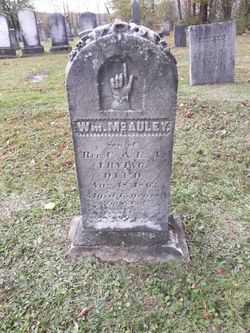IRVING, Clark (Associate Reformed Presbyterian)
Manual of the United Presbyterian Church of North America 1751-1887 : containing the changes to January 1892 / by James Brown Scouller 1820-1899 – page 392 in the original edition
“Was born May 10, 1810, in county Armagh, Ireland. His parents came to the U.S. in 1813, and settled at Montgomery, N.Y., where he was brought up. He was graduated at Union College, (Schenectady NY) in 1838, and studied theology at Newburgh; was licensed in the spring of 1841 by New York Presbytery; had charge of the classical school, in Newburgh in connection with the Theological Seminary 1841-‘6; was ordained Sept. 9 1846, sine titulo, by Saratoga (Presbytery); was pastor of Kortright, Delaware Co., N.Y. as assistant and successor of the Rev. William McAuley, June 16, 1847-Sept. 1879; had charge of the classical department of Stamford(N.Y.) Academy 1870-76 and then retired to Montgomery, Orange Co., N.Y. where he died Oct 16, 1888. “
Also found in similar form on page 170 – with the last phrase indicating the date of death added (The )Cyclopedic Manual of the United Presbyterian Church of North America, 1903; William Melancthon Glasgow –
He married Elizabeth A. Pinkerton at Little Britain Presbyterian Church, Rock Tavern, Orange County NY on 25 April 1843 and they had three sons, one of whom was named after William McAuley and died as a young man in 1863 and is buried in the church cemetery in Kortright NY, Robert C. who may have died at sea, and Rowland C. who may have been a medical doctor and died in Binghamton NY.
Notice that his ordination was ‘sine tutulo’ – an unusual situation, that is, without being already called to Pastor a church; and was probably an ‘after the fact’ recognition that he had been for several years (?5) teaching students who were themselves preparing to become ministers. It seems to follow an older tradition of being ordained in some special cases to Teaching theology, which goes all the way back to John Calvin in Geneva who used a fourth order of ordination as Teacher or Doctor, besides Deacon, Elder and Pastor.
In these years of the 1800’s many Presbyterian ministers were educated at Union College in Schenectady, and given a theology degree similar to that of the various Theological seminaries – and on that basis were ‘licensed to preach’ by their Presbytery before being called to a pastoral position. It appears that Clark did that, but then also went on to further education and !teaching! in some capacity at Newburgh Theological Seminary.
Was there a connection to noted author, Washington Irving? After all, Sleepy Hollow is not very far from Rock Tavern, NY! So far, I don’t have much evidence for or against this idea – and it might also be interesting to explore. However, Washington Irving’s ancestors (from Scotland?) were in this country several generations before Clark Irving’s came from N. Ireland.
As far as I know, we aren’t related, despite common roots in Ireland. In fact, I did not (yet) find a living descendant. But that doesn’t mean he wasn’t worth researching – on the contrary, I’ve enjoyed this bit genealogical/historical research. For one thing, it confirms to me that most genealogists don’t know squat about using the records of Presbyterian churches and the Presbyterian denomination – they seem to assume that the people who invented the role ‘clerk of Session’ and ‘Stated Clerk’ don’t keep valuable or accurate records, and generally ignore/don’t consult the Presbyterian Church records except in accidental cases.
Since, in my role as Stated Clerk of a Presbytery, I had the responsibility of annually reviewing the records of 60 congregations and reporting the results in the official minutes, as well as answering historical record requests, and also of transferring the records of dissolved churches to the national church archives in Philadelphia, I knew something about the church that the Rev. Clark Irving served for the bulk of his career. Several years ago, I took a carton load of those records to Philadelphia and deposited them with the archivist.
Briefly (this is all from memory at the moment), the Gilchrist Memorial Presbyterian Church was the oldest congregation of this region, started in the Kortright Patent prior to the American Revolution by Associate Reformed (Seceder) Presbyterians of Scots descent. Most of these were ‘Ulster Scots’ from Northern Ireland (sometimes called Scotch-Irish). There was a hiatus during the Revolutionary War years as Indians in the area were generally allied with the British, but the church was revived after the war – one of the strong families was that of elder Alexander Leal. The Gilchrists would become involved later and the Kortright church would change its name in the late 1800’s due to their influence. Rev. William McAuley (1765-1851) became the Pastor and served for decades. He is buried in the church cemetery, and under his leadership, the church grew to over 300 (?500?) members – located not in a town or village – but on a hilltop in the country. As a result of this growth, they called a young Associate Pastor, the Rev. Clark Irving, who also served the church for several decades.As I was walking the graves of this cemetery in 2019, I saw the tombstone below and took my first picture of a stone in that cemetery.

At first I was taken by surprise since I knew that the stone of Rev. William McAuley was elsewhere in the cemetery, but then I looked closer and realized that this young man, not quite 16 years old at death, son of another pastor, had been named for the more famous pastor of the church. Thus began my search for information on his parents and family. A four-sided monument (centopath?) nearby has the names of his father, mother, a brother who died in his 20’s, and another brother. It is not certain how many of them are actually buried there. Robert is probably buried there – I didn’t do justice to researching his death record. Elizabeth Ann Pinkerton Irving may have been buried there, since she died before Clark left the area – but she also may be buried in Orange County, where Clark himself died. Ultimately I would find William’s Baptism and also his death in the church Session records. Rowland C. – the potential medical student/doctor is probably named for the Rowland family that was active in the church, and the C. initial in both Robert and Rowland is probably Clark after their father.
Rowland is a particular case, since he may have married a woman, Effie Boresh, from a Virginia family in the Washington DC area during or after his medical training in NY City, but there is no record of divorce or children, yet he appears 5 years later in Binghamton NY practicing medicine, and married to someone else,and this wife (and a child) also disappears. Dying intestate and without any family being noted at the time of death, he may or may not have been buried in Kortright.
Other relatives of Clark Irving or Elizabeth Pinkerton may have remained in the Montgomery and Rock Tavern areas of Orange County – but I have yet to discover any connections that would clarify this family and its destiny any further.
